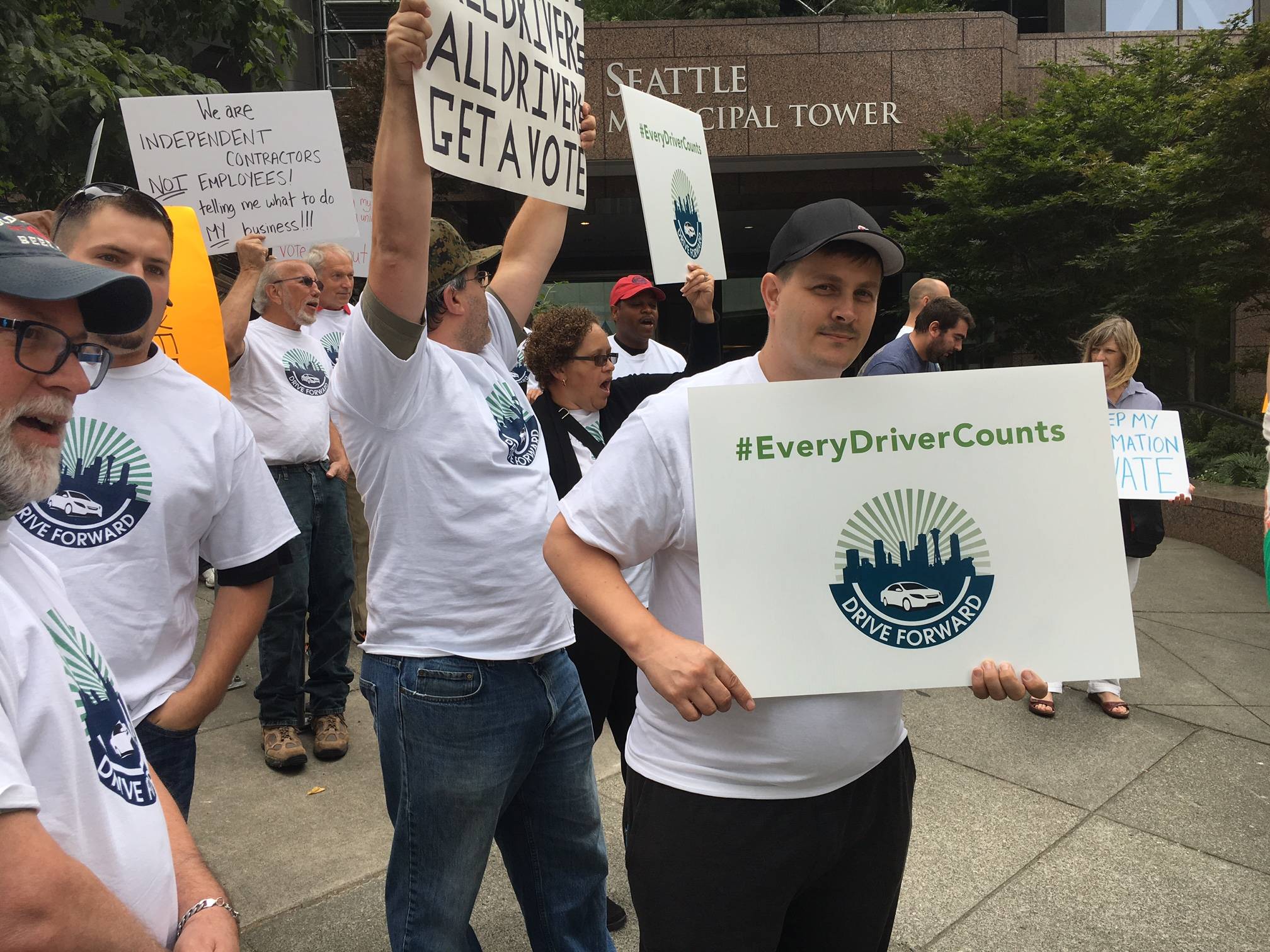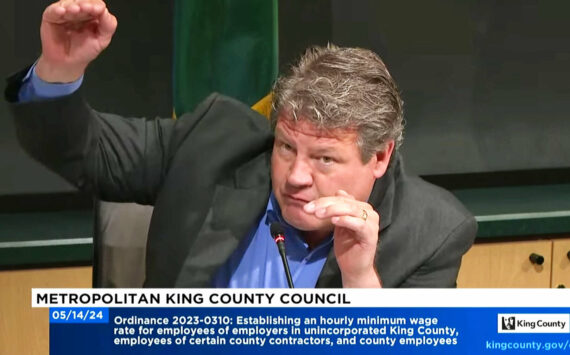There’s little question as to who’s to blame for the long delay in implementation of Seattle’s first-of-its-kind ride-share unionizing ordinance: Lawsuits filed by those opposed to the unionizing effort, namely the U.S. Chamber of Commerce and a group of local drivers, have spurred a series of injunctions that have barred the city from putting the law into practice for several months now.
Yet the delay of their own making is causing some trouble for those opposed to unionizing. As the law is written, the more time that passes before a vote is taken on whether local drivers should unionize, the smaller the portion of drivers eligible to vote is. That, by everyone’s calculus, stands to benefit unionizing efforts, since longtime, full-time, drivers have the most to gain from organizing (and, labor supporters say, the most to lose from bad corporate practices).
When the City Council passed the collective-bargaining law in 2015, it did not specify which drivers would be allowed to vote on whether to unionize. The very nature of the work makes it a tricky question. Unlike, say, postal workers or longshoremen, there are wide variations in how often rideshare drivers work; should someone who signed up as a driver but rarely does so be allowed to vote? Or only full-time, longtime drivers?
The question to what drivers should vote was left to the Department of Finance and Administrative Services. Uber and Lyft lobbied for FAS to make the pool as big as possible; the Teamsters and pro-union drivers wanted some requirements to be set, lest efforts be sunk by a bunch of drivers who do little actual driving.
FAS ultimately landed on drivers who:
– Have been with the company for the previous 90 days and;
-Have made at least 52 trips to or from Seattle within any three-month period in the past 12 months.
Here’s the rub: The director’s rule states that those dates apply to the “commencement date” of the law, which was January 17 of this year. Therefore, drivers who weren’t with Uber or Lyft prior to October 19, 2016, aren’t eligible to vote on unionizing, whenever that vote happens.
At this point, anti-union drivers say, there are thousands of drivers with Uber and Lyft who would not be allowed to vote on unionizing. A handful of those drivers turned out for a small demonstration Wednesday calling on the city to amend its rules to allow more drivers to vote.
David Longwell, 41, says he’s been driving for both Uber and Lyft for 10 months and has given about 3,000 rides. He says he was a member of the Teamsters union when worked for Waste Management and was “super pro union.” Then, during the garbage strike in 2012, he says the union was “all over us to make sure we paid our union dues” as their paychecks dwindled.
Now, he says, he wouldn’t have a say over whether to join back up with the Teamsters (Teamsters Local 117, the union that has been doing most of the organizing so far).
“They gave a date. I started right after,” he says.
Drive Forward Seattle, a group of drivers opposed to unionizing, says in a letter FAS director Fred Podesta that “the city is silencing the very drivers it claims to be trying to help.” In a press release, Drive Forward says more than half of active drivers in Seattle started after Oct. 19 cut-off date.
According to Cyndi Wilder, a spokesperson at FAS, the commencement date could be updated at the request of the Teamsters “or another organization seeking to represent drivers.”
“To date, a new commencement date has not been requested,” Wilder says by email.
Dawn Gearhart with Teamsters 117 says that the union was in fact going to request a new commencement date, which would provide the Teamsters with a more accurate list of active drivers in Seattle. However, the U.S. Chamber of Commerce’s recent appeal of a lower-court decision throwing out their lawsuit has put that effort on hold.
Matthew Eng, who is leading the process at FAS, says the delay is something they are aware of.
“We’re continuing to have these discussions about the spirit of the ordinance, given where we are today,” he says. “Obviously the lawsuits don’t engendered a lot of good will; we are continuing to have discussion with how to proceed with our implementation.”
The irony, of course, is that the reason there hasn’t yet been a vote is that several lawsuits are attempting to block any vote at all. And as it happens, the wait just got a little longer this week.
Last week, we reported that the final lawsuit targeting the law had been struck down. It was the second time this month that U.S. District Judge Robert Lasnik ruled in favor of the ordinance. Since Lasnik simultaneously struck down an injunction against its implementation, the path looked clear for Seattle to move forward with the law.
That’s no longer the case.
The first lawsuit that Lasnik struck in early August was the one brought by the U.S. Chamber of Commerce alleging that the ordinance violates federal antitrust laws. That was immediately moved to the 9th District Court of Appeals, and on Tuesday the court ruled in favor of the Chamber’s request to issue yet another injunction against the law. So, once again, the city must hit the pause button.
The City Attorney’s office plans to put up a fight. “The Court’s ruling does not speak to the merits of the Chamber’s claims, and allows for orderly briefing in the matter,” reads a statement from the office. “The City will file its opposition to the Emergency Motion early next week and looks forward to defending this publicly important law on appeal.”
This pause could be a short one. But, as City Attorney spokesperson Kimberly Mills put it last week, these things aren’t predictable. “We never know what’s coming down the pike,” she said.
dperson@seattleweekly.com
This report includes archive material from Casey Jaywork.
This post was updated at 3:40 p.m. with material from the protest.








